S.K.H. Silva1, C.M.C Shashikala1, R. Shanmugalingam1, C. Arambepola2
1Faculty of Medicine, University of Colombo
2Department of Community Medicine, Faculty of Medicine, University of Colombo
Plastics and evolution of plastic consumption
Plastics are usually made up of synthetic compounds and therefore it is called non- biodegradable plastics. These are divided into two types namely, thermoplastics and thermosetting plastics. Plastics that are made up of biodegradable polymers are called biodegradable plastics. With the increase in plastic production, the plastic consumption rate has also increased drastically over the years. Therefore, an enormous amount of plastic waste is produced annually. Figure 1 depicts the global production of plastics, and it shows that 50% of the plastics are produced in the Asian region.
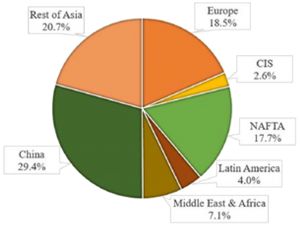 Developed countries manage these plastic wastes efficiently by reuse, recycle and incineration methods. In contrast, developing countries still resort to unsuccessful ways of plastic waste management such as burning, burying and open dumping which could lead to numerous environmental adverse effects. Studies have shown that improper plastic waste disposal is associated with pollution of water, air and soil, harm to marine life, climate change and spread of vector borne diseases.
Developed countries manage these plastic wastes efficiently by reuse, recycle and incineration methods. In contrast, developing countries still resort to unsuccessful ways of plastic waste management such as burning, burying and open dumping which could lead to numerous environmental adverse effects. Studies have shown that improper plastic waste disposal is associated with pollution of water, air and soil, harm to marine life, climate change and spread of vector borne diseases.

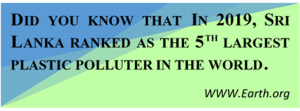
Sri Lankan situation of plastics
Production of plastic waste has increased in Sri Lanka over the last few decades and therefore, plastic disposal has become a substantial burden. Assessing the plastic waste management practices among the public and evaluating their knowledge and attitudes on this aspect is essential to make strategies to overcome this burden. Since it is often housewives who usually handle waste at household level, we conducted a study to assess the plastic waste management practices and associated knowledge and attitudes on its environmental impact among housewives residing in urban households within the Panadura MOH Area.
What we did in our study…
We selected 120 housewives from five public health midwife (PHM) areas of the Panadura MOH Area, using a sampling strategy known as three-stage cluster sampling. We used an interviewer-administered questionnaire asking them about their plastic waste management practices, knowledge and attitudes on the environmental impact of plastic waste. A scoring system was designed (with mean value taken as the cut-off) to assess the level of plastic waste management practices, in which 3R (reuse, recycle and reduce) were identified as proper waste management practices and burning, burying and open dumping as improper practices. We then compared their practices with their knowledge and attitudes.
What we found…
Usage pattern of plastics
The commonest type of non-degradable plastic used in households was bags(99.2%) followed by bins, buckets, barrels(95.8%) and bottles(89.2%). The low cost and ready availability of plastic bags may have contributed to this usage. Plastic bag was also the most commonly used item among the biodegradable products (59.2%), while 90% or more were not using any other biodegradable product. This common household practice of using biodegradable bags can be attributed to the current Sri Lankan ban on non-biodegradable polythene bags. As the authoring officer, public health inspector can take legal action on establishments that do not comply with such rules.
Plastic waste management practices in households
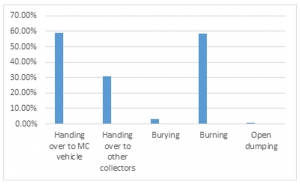
Overall, 72.5% of housewives were identified as resorting to proper plastic waste management practices.
Figure 2: Distribution of the disposal methods of the plastics
As figure 2 shows Majority were handing plastic to the municipal council vehicle and also burning plastics.
Almost 90% of the households separated plastic from their domestic waste, but not a single household was separating plastics into biodegradable and non-biodegradable categories.
Almost 70% of the housewives were reusing plastics for the same purpose with 36.1% doing so on a daily basis for at least 1-3 months. Housewives were also reusing plastics for other purposes, such as for carrying food and water (52.0%) which could also taken as an indirect way of reducing the use of plastics.
Knowledge and attitudes on environmental health impact the plastic waste management
Among housewives 55% have heard about the 3R concept and majority (98.3%) knew about the reduce component.
Further, only a little less than half (48.3%) were aware of the numbering scale used on plastic containers for evaluating the environmental health impact. Even among them, the specific knowledge was poor in 70.6%, reflecting the need for improving the technical knowledge on plastic among housewives, who can act as change agents in households.
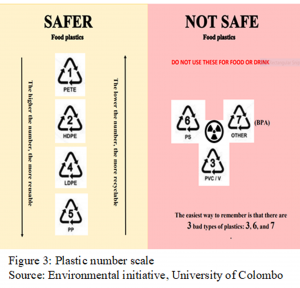
In contrast, 86.5% or more were having good knowledge on the adverse effects on environment, such as soil, water and air pollution, climate change, vector borne diseases and marine pollution.
Regarding the attitudes of housewives on the environmental health impact of plastic waste management, over 90% strongly agreed that environmental pollution should be taught in school curriculum (89.2%) and were concerned about the diseases related to plastic (70.0%). However, only a lesser proportion strongly felt that they play an important role in managing plastic waste (50.8%).
Determinants of improper plastic waste management practices
As shown in Figure 4, overall poor knowledge on the consequences of plastic waste as well as negative attitudes on the environmental health impact of plastic waste were identified as significant determinants of improper plastic waste management practices in households.
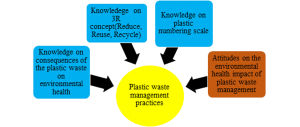
Figure 4: Determinants of plastic waste management practices
Message to the society and relevant authorities
Majority of housewives demonstrated good level of plastic waste management practices along with good level of knowledge and positive attitudes. However, some crucial aspects related to knowledge and attitudes such as plastic numbering scale, 3R concept and attitudes on environmental health impact of plastics need to be given more attention through media and school-based education programmes. There should be reinforcement towards manufacturing of biodegradable plastic products and alternatives for plastics, if Sri Lanka is to reduce its burden of plastic waste management.
